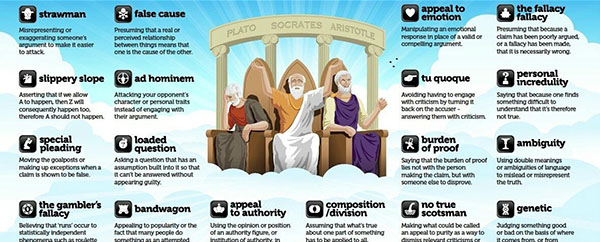Natural Equals Good – Logical Fallacy

“This ________ is natural, people have used it for thousands of years, it must be good.” The argument that because something is natural it must be good is an example of a ‘logical fallacy’, a tool often used in a discussion/marketing that sounds very supportive to the argument but is actually based on a gross misassumption. The suggestion that because something has been done for 1000’s of years it must be good is another logical fallacy. Identifying such logical fallacies is paramount when seeking validity in argument.
Let’s start by highlighting the fact that in many cases, people do not even know they are using logical fallacies in their discussions/arguments. They are extremely useful methods that we learn typically as children can be used to persuade the child/adult in front of us that our opinion is correct, and that we should therefore get what we want.
There are many, many types of logical fallacy, but the one called ‘appeal to nature’ is probably the easiest to see through when we take a moment to examine it.
Appeal To Nature Fallacy
Let’s use a current example: “I’m not going to vaccinate, because before vaccines children built immunity naturally for thousands of years.” This is a perfect example of appeal to nature fallacy that implies that if we do things ‘naturally’ things will be ok. It implies that ‘nature’ is designed to ‘look after us’, that as long as we let nature do its thing then we will be ok.
The defeat of this argument lies in the fact that ‘nature’ is not designed to help us. Nature really doesn’t care if we live or die. Tsunamis, earthquakes, hurricanes, these are all ‘natural’, as are deadly animals, poisonous flowers, and so on. The fact that something is natural does not mean that it is good.
And it works of course both ways – the fact that something is not natural does not mean that it is bad. With regards to the anti vaccine arguments, let ‘s not forget that thanks to unnatural vaccines and antibiotics (not natural herbs or oils) we can now deal with once life threatening diseases such as smallpox and measles. Mortality rates (particularly for children) have gone down over time and life expectancy has gone up thanks to the use of non natural products.
Appeal To Antiquity Fallacy
Now we have seen how a logical fallacy operates, let’s look at another example commonly used example, one that is in fact used in our vaccine comment:
“…People have used it for thousands of years, it must be good.”
Appeal to antiquity (also known as ‘appeal to tradition’ and ‘argumentum ad antiquitam’) is a logical fallacy in which the assumption is made that older ideas / people are better, the assumption that if an idea / person has been around for a long time then it must be true. This as we shall now see is not automatically the case.
Using our vaccine example – yes, before vaccines people did indeed for thousands of years not use vaccines. But that does not mean they were better off. Smallpox used to kill thousands of people but today, it no longer exists. The last case of smallpox was reported in 1977, and in 1980 the World Health Organization declared that smallpox had been eradicated. Smallpox is gone thanks to vaccines, so just because there was no vaccine for thousands of years does not mean people were better off back then. In countries without vaccines, there are still thousands of natural measles deaths every year. Doing what people did for thousands of years is not a valid argument. It’s an appeal to antiquity.

There are many other examples of logical fallacy that we should be aware of, to both help ourselves avoid their use when discussing something and to recognise their use in other’s arguments. Identifying and avoiding their use helps a discussion progress, it helps positive outcomes, and in the world of soft tissue therapy and health care it helps guide an evidence informed approach rather than misguided loyalty to a particular idea based on misassumption.
The image you can see is from excellent website Logic of Science which has been writing about logical fallacies for years (see what I did there!). The ‘Strawman Fallacy’ is another one I would suggest you get to recognise, , as well as the ‘Ad Hominem’, ‘Anecdotal’ and ‘Burden of Proof’. I’ll probably write a follow up to this blog in the future giving examples of these.
It is no suprise that logical fallacies can often be found in arguments supporting the use of adjuncts that lack scientific evidence. Take a look at most discussions about the use of Natural Remedies , Homeotherapy and Acupuncture and you will find many logical fallacies. This isn’t to say that we should all stop using such adjuncts (such a claim would itself be a logical fallacy) but their use does weaken arguments both for/against such adjuncts, so should be identified & avoided by all parties involved.
I hope this piece stimulates some thought. Remember, none of this is about ‘being clever’ – few people would recognise logical fallacies unless they were highlighted. But once you are aware of them, they can play a huge part in being able to properly critique the blurb often used on marketing, in research papers, in books and blogs.
Related Posts
Five Best Ways For Runners To Warm Up
Want to know the five best ways for runners to warm up? What does the evidence say about Static stretching? How about Dynamic Stretching? What’s Dynamic Mobility? Prepare for surprises!
Hill Sprints for Novice Runners
For those relatively new to regular running, the notion of introducing maximal effort hill sprints is often met with concern over the possibility of over-training and encouraging injury. And yet, including one or two weekly hill sprint sessions into your training may well be safer than just knocking out long distances on flat ground.
How to Breathe when Running
The question of ‘how to breathe when running’ is one that many runners find themselves pondering, especially those new to running or starting to experiment with more intense sessions like sprint or hill intervals. Should we breathe through the mouth or nose? Is there a particular rhythm or technique we should be using?





0 Comments
Trackbacks/Pingbacks